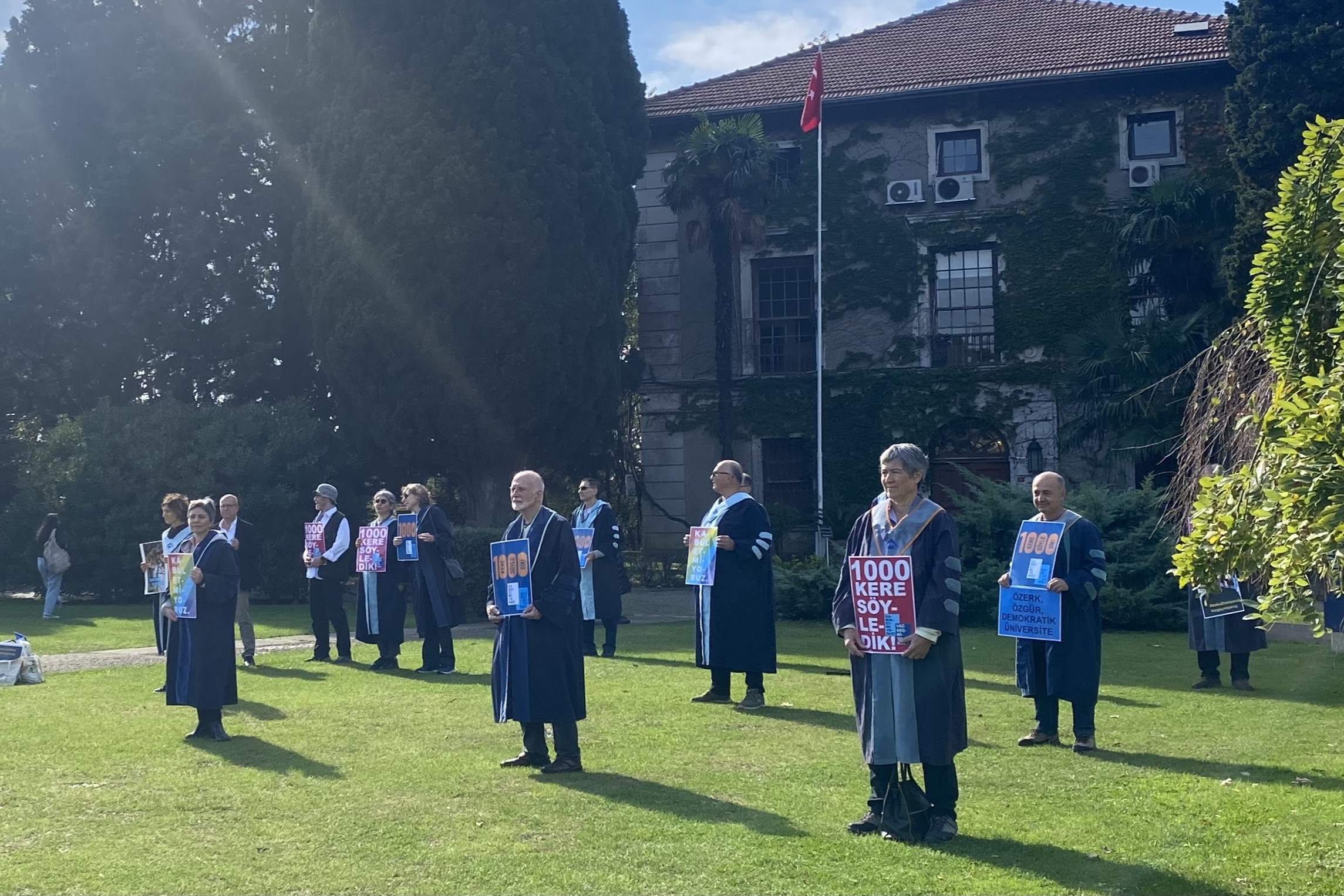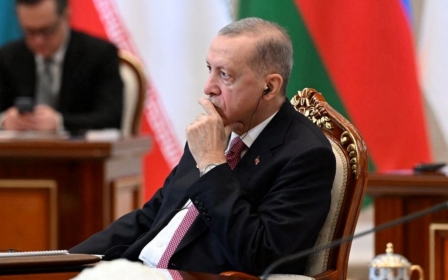Turkey: Bogazici University protest vigil still going strong after 1,000 days of 'resistance'

For more than 1,000 days, the rector of Bogazici University in Istanbul has been able to look out of the window of his office and see a host of faculty members, dressed in formal robes, standing on the grass with their backs to him.
A number of them continue to hold placards demanding a return to the internal democracy that characterised the university in the past, or for the reinstatement of sacked staff, or for the resignation of the government-appointed - and wildly unpopular - rector, Mehmet Naci Inci.
Despite constant pressure, and the apparent refusal of the Turkish government to budge, the university's faculty and students have continued their "resistance" against what they see as right-wing interference in their educational process.
Bogazici University had informally held internal elections to select candidates for rector since 1992, but in 2016, in the wake of an attempted coup in Turkey, the government used a state of emergency to change the process, giving the power to the Turkish president.
In January 2021, the appointment of Melih Bulu as rector sparked mass protests at Bogazici University and across the country, over fears the government was threatening the independence of this highly regarded institution. There were repeated clashes between students, faculty and police, and scores of arrests.
Stay informed with MEE's newsletters
Sign up to get the latest alerts, insights and analysis, starting with Turkey Unpacked
Eventually the pressure forced Bulu from his post, a seeming success for the protesters. But in August of that year, Bulu's vice-rector, Naci Inci, was appointed to the role.
The years since have seen the struggle continue, but many students and staff have suffered as a result: educations and careers have been ruined, while the atmosphere on the once vibrant campus has become grim and autocratic.
Can Candan, an academic who was one of the most prominent voices opposing the state-appointed rectors, has found himself caught in a seemingly endless legal battle with the university management.
Naci Inci, who was then interim rector following Bulu's removal, refused to renew Candan's contract in July 2021. Candan had this overturned following a legal challenge, but was again dismissed in July 2022, a few months after his reinstatement. He was, again, able to overturn this decision, but was yet again dismissed in July 2023 - a ruling he is, once again, challenging.
As he awaits the decision, Candan has been banned from campus. Despite all the hardships, he is enthused by the ongoing resistance by the students and faculty.
"It feels great! It is historical! I don't think there is any other example of such an ongoing protest at a university anywhere in the world," he told Middle East Eye.
"The performative silent and peaceful vigil shows the dedication and commitment of the faculty. So far, 16 of us are facing disciplinary action within the university for participating in the vigils, despite the fact that peaceful protest is our constitutionally protected right. Whatever the disciplinary sanctions would be, we know that the courts will eventually annul those."
'Nobody is happy'
In July, the university said that, for the third year in a row, there would be no collective graduation ceremony, over fears that students would use it as an opportunity for protests.
In 2022, following the ban, students announced their own alternative graduation ceremony and, in response, the administration announced two days before the ceremony that all graduate alumni cards would be cancelled and they would be banned from the campus.
In one of the latest rulings, in June, an Istanbul court sentenced four students each to 10 months in prison over allegations they threw plastic bottles filled with paint in front of the rectorate building during a protest in November 2021.
Protests in general were also banned on the campus in June, shortly after the re-election of Turkish President Recep Tayyip Erdogan.
Despite this, demonstrations broke out in August after the rectorate announced the closure of a number of long-established student clubs, nominally to make way for new student dorms. Footage released on social media showed police and security guards clashing with students:
When it comes to the faculty, the pressure from the administration has ranged from the punative to downright petty.
Last week, Turkish media reported that Naci Inci had appointed two staff members from the university's computer centre to work in a small hut 880km from Istanbul in the Sivas countryside, nominally an earthquake-monitoring station.
One of them, Nilgun Sahin - who worked at the university for 17 years and who has a one-year-old son with a health condition - said there was no transport to the hut from the nearest city of Sivas, and no computer present. She was later sacked from her job and banned from Bogazici campus on the grounds that she had failed to do her job.
However, Sahin told the online news site Diken that she was one of many academics who had been pushed out of the university for their lack of loyalty to the new rector.
'It's more like a prison rather than a campus, frankly'
– Mine Eder, professor
Mine Eder, a professor in the Department of Political Science and International Relations, said she had "lost count" of the number of proceedings that had been opened against her, and that "nobody is happy".
"Nobody is happy on the faculty front as well as the student front, because the students, I mean… they've lost their dorms. They're incredibly critical about the prices of food in campus... they've been evacuated from their student activity club rooms," she told MEE.
"They really are not let alone. I mean, the civil police is everywhere. The cameras are all there. So, I mean, there's a whole big brother watching, you know what I mean? It's more like a prison rather than a campus, frankly."
Ideological battlegrounds
To put it mildly, university campuses being an ideological battleground is not a new development in Turkey.
In the 1970s, left-wing Turkish and Kurdish students often fought gun battles with ultra-nationalist and Islamist groups on university campuses. The era of political violence in Turkey saw thousands killed across the country, including at schools and universities, and eventually prompted the 1980 coup which brutally quelled the ideological battles and crushed leftist (and to a much lesser extent right-wing) militancy in the country.
Another process initiated by the coup was the opening up of the previously protectionist country to the world markets, and the introduction of neoliberal reforms. This was combined with the promotion of a socially conservative "Turkish-Islamic" synthesis that advocated piety and nationalism to stave off the threat of communism.
The processes initiated in the 1980s are seen by Bogazici faculty staff as continuing to this day - although some have noted that even at the height of 1970s political violence, the police never entered their campus.
'Even the public actually believes universities are there to, you know, invent new weapons or something'
- Zeynep Gambetti, academic
Zeynep Gambetti, who retired from Bogazici in 2019 and was later prevented from returning to teach part-time, told MEE that when it came to higher education, the dominant mindset of the Turkish government was that it should be in the service of "either neoliberalism, capitalist accumulation or big corporations, or of the government's developmental projects", and that it was otherwise "crap and or dangerous and risky".
"The packaging included that we bred terrorists in our midst," Gambetti added.
"That means we were allowing Kurdish studies… you know, theses on the Kurdish question, also minority questions like the Armenian question, to be researched."
She said there seemed to be little concern from the government as to the harm being done to the university's reputation. Fundamentally, Gambetti believed that gaining political control of the university was at the forefront of Ankara's mind, and that ultimately all that mattered to government was that education served "accumulation processes, the market and the government's objectives in Turkey.
"And that's why we're having so much difficulties trying to convince even the public that an independent university is a must," she explained.
"I mean, even the public actually believes universities are there to, you know, invent new weapons or something."
Brain drain fears
Perhaps the biggest concern among many academics in Turkey is the risk of brain drain.
According to TurkStat, the government’s statistics bureau, 139,531 Turkish citizens left the country in 2022, compared with 103,613 in 2021, with those aged 25 to 29 forming the biggest group.
Repeated polls have shown a majority of young people in Turkey expressing a desire to leave.
One poll by the Konrad Adenauer Foundation said 63 percent of those between 18 and 25 expressed a desire to live in another country, citing a lack of personal and economic freedoms. Some 61.3 percent of participants specifically cited economic difficulties they experienced during their education.
Despite such ominous statistics, and the failure of political change in Turkey, Candan says he still has hope for the future.
"We are in a crisis in the country and at our university right now, but crises do not last for ever. The current authoritarian regime will eventually cease to exist, and one day, hopefully in the near future, starting with our university, we'll see significant changes in higher education in Turkey as well," he said.
"A significant percentage of Turkey's population is made up of young people. In this globally connected age, young people know that they deserve much better than what they are able to get under the Erdogan regime now."
Middle East Eye delivers independent and unrivalled coverage and analysis of the Middle East, North Africa and beyond. To learn more about republishing this content and the associated fees, please fill out this form. More about MEE can be found here.





